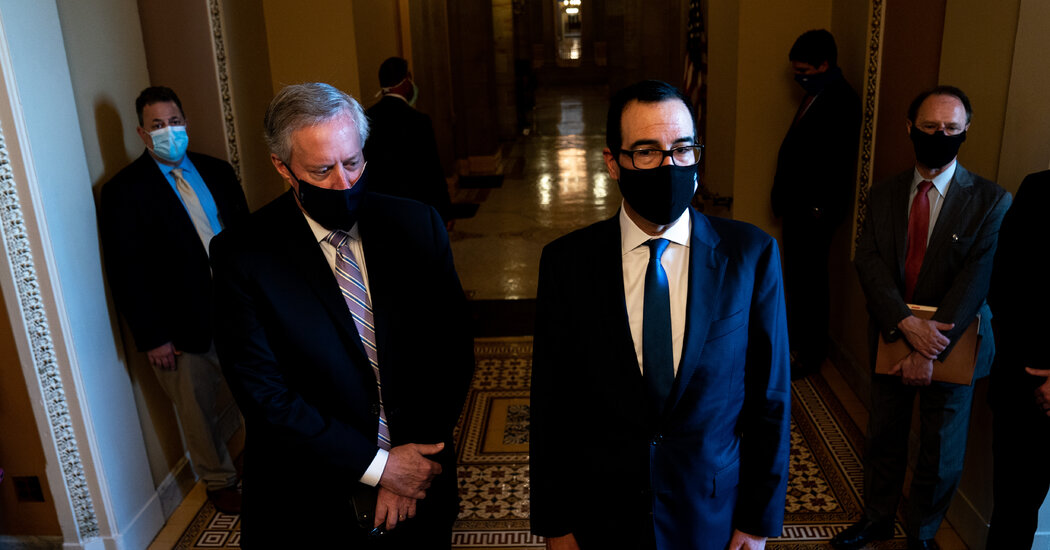MARKETING NEWS
Trump Officials Float Idea of Narrow Bill to Extend Unemployment Benefits
In addition to the unemployment benefits change and liability protections, the Republican legislation is expected to include $105 billion for schools and billions of dollars more for testing, contact tracing and vaccine distribution. Some of the education funds would be reserved for elementary and secondary schools that are reopening and bringing students back to a more traditional, in-person setting.The Coronavirus Outbreak ›Frequently Asked QuestionsUpdated July 23, 2020What is school going to look like in September?It is unlikely that many schools will return to a normal schedule this fall, requiring the grind of online learning, makeshift child care and stunted workdays to continue. California’s two largest public school districts — Los Angeles and San Diego — said on July 13, that instruction will be remote-only in the fall, citing concerns that surging coronavirus infections in their areas pose too dire a risk for students and teachers. Together, the two districts enroll some 825,000 students. They are the largest in the country so far to abandon plans for even a partial physical return to classrooms when they reopen in August. For other districts, the solution won’t be an all-or-nothing approach. Many systems, including the nation’s largest, New York City, are devising hybrid plans that involve spending some days in classrooms and other days online. There’s no national policy on this yet, so check with your municipal school system regularly to see what is happening in your community.Is the coronavirus airborne?The coronavirus can stay aloft for hours in tiny droplets in stagnant air, infecting people as they inhale, mounting scientific evidence suggests. This risk is highest in crowded indoor spaces with poor ventilation, and may help explain super-spreading events reported in meatpacking plants, churches and restaurants. It’s unclear how often the virus is spread via these tiny droplets, or aerosols, compared with larger droplets that are expelled when a sick person coughs or sneezes, or transmitted through contact with contaminated surfaces, said Linsey Marr, an aerosol expert at Virginia Tech. Aerosols are released even when a person without symptoms exhales, talks or sings, according to Dr. Marr and more than 200 other experts, who have outlined the evidence in an open letter to the World Health Organization.What are the symptoms of coronavirus?What’s the best material for a mask?Does asymptomatic transmission of Covid-19 happen?So far, the evidence seems to show it does. A widely cited paper published in April suggests that people are most infectious about two days before the onset of coronavirus symptoms and estimated that 44 percent of new infections were a result of transmission from people who were not yet showing symptoms. Recently, a top expert at the World Health Organization stated that transmission of the coronavirus by people who did not have symptoms was “very rare,” but she later walked back that statement.The bill is likely to provide for another round of stimulus checks to American families, though it remains unclear who would be eligible to receive those payments. Larry Kudlow, the director of the National Economic Council, said on Sunday that the checks would be worth $1,200, though he did not detail who precisely would receive them.The largest sticking point, though, has been the effort to scale back unemployment insurance benefits. The White House and congressional Republicans largely agree that the $600 weekly payment established in the $2.2 trillion stimulus law on top of state unemployment pay is too generous, in some cases providing recipients more money than they received in their job, and discourages people from returning to work.“The original unemployment benefits actually paid people to stay home, and actually a lot of people got more money staying at home than they would going back to work,” Mr. Meadows said on Sunday. “So the president has been very clear, our Republican senators have been very clear, we’re not going to extend that provision.”Democrats, who want to extend the current benefit through the end of the year, say Republicans’ plan would present significant technical hurdles and cut funds to Americans when they need it. When Democrats in March proposed matching 100 percent of a worker’s prior income, Labor Department officials said that antiquated state unemployment systems would make it too complicated to execute.The National Association of State Workforce Agencies also warned Capitol Hill this week that such a significant change to the current program was likely to take months for states to carry out, according to a memo obtained by The New York Times, meaning that it would take even longer for Americans to start receiving the benefits again.Even though the benefits program is set to expire at the end of July, workers in most states are already losing access to the expanded unemployment payments. Experts fear further economic turbulence if the program is not quickly reinstated.
Source link













